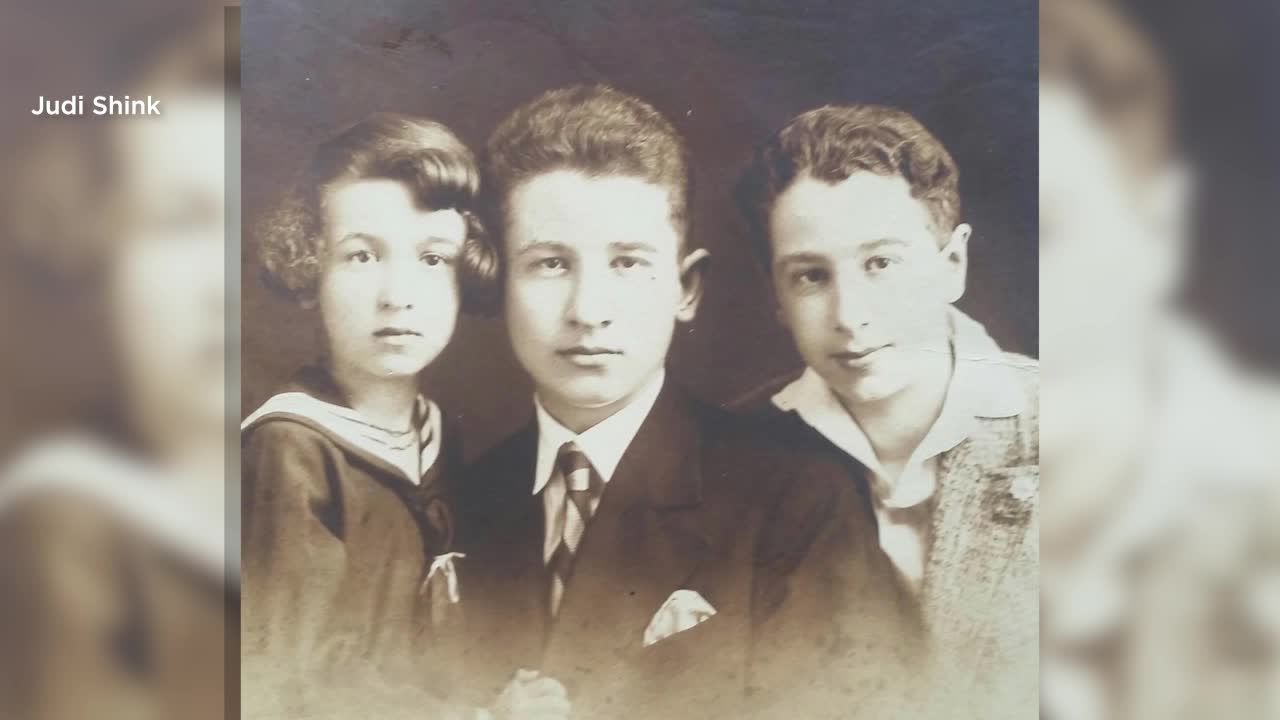“They were just one of so many million — that’s my family’s story.”: Minnesota observes Holocaust Remembrance Day
[anvplayer video=”5159811″ station=”998122″]
Friday was International Holocaust Remembrance Day — remembering millions of Jews murdered by the Nazis.
Jan. 27 is also the anniversary of the liberation of Auschwitz, the largest German Nazi concentration camp.
“So they were young children, and they were just one of so many million,” recalls Judi Shink, showing a black and white photo of three kids. “But that’s my family’s story. My four grandparents survived the Holocaust, but most of their family did not.”
Shink, raised in Milwaukee but now living in Wayzata, shared stories with 5 EYEWITNESS NEWS about her family’s fate during the Holocaust.
Her four grandparents somehow lived through it all, she says — but dozens of other family members perished in concentration camps.

Courtesy of Judi Shink
“They were taken to camps right away, in 1939,” Shink explains. “Poland was one of the first countries that was invaded by Hitler and people were taken.”
She says she learned much of her family history from her grandfather, Jack Grimbaum.
“I remember my grandfather telling me every time a train came and took people, we knew no-one ever came back, but we didn’t know where they were going, and they’d say pack a bag,” Shink recalls.
A story that was repeated again and again.
According to the United States Holocaust Memorial Museum, 6 million Jewish men, women, and children were “systematically persecuted and murdered by the Nazi regime and its collaborators.”
“On this day in 1945, the Soviet military liberated the three camps comprising Auschwitz where approximately 1.3 million people were murdered,” says Mitchel Chargo, the president of The Institute of Holocaust Research and Education(IHRE). “90% of the victims were European Jews.”
The Wayzata non-profit’s mission is to raise awareness about the Holocaust.
Chargo says the group just launched a website last week.
The hope is to reach Gen-z and Millennials — and to push back against Holocaust deniers.
“Our battleground is going to be on social media because that’s where we are meeting these younger generations,” Chargo says. “Holocaust distortion is becoming the larger problem, which is the misinformation or minimizing the impact of the holocaust or downplaying the number of victims of the Holocaust or if you can believe it, claiming that the Jews brought the Holocaust upon themselves.”
Shink says she’s spent years of research, even visiting a Holocaust museum in Israel, trying to learn what happened to family members who simply disappeared.
“Those years happened — they matter,” she declares. “I mean, my entire family was almost wiped out because they were Jewish.”
Shink says she did learn how her grandfather, who she says sewed suits for Nazi officers in exchange for an additional potato ration, escaped from one camp in April 1945.
She notes he wore one of those suits and walked out of the camp, before hiding in a nearby forest for two days.
“He stayed there, thinking he was going to die in the forest, because there was nowhere to go,” Shink remembers. “Then he said he saw a helicopter come over, so weak he couldn’t raise his hand. But it landed, and it was a Russian officer who told him that (the camp) was liberated.”
The Wayzata resident, an IHRE board member, says her words are living testimony to the Holocaust.
She is determined, she says, that future generations know what she knows.
“I am one of the last generations that will have met survivors and sat with them and been in the pool and seeing the tattoo of the numbers while they’re talking, and realizing what that meant,” Shink says. “We have to remember to act, we have to remember to stop prejudice, to speak up even when it’s hard. That’s what I feel I can do to honor my grandparents.”
Lessons learned for future generations.
“This event, which was one of the most devastating and traumatic events in known history, is a chance for all of us to examine how the bonds of human decency can break and shatter in such a short period of time,” Chargo says.
You can find out more about The Institute for Holocaust Research and Education here.